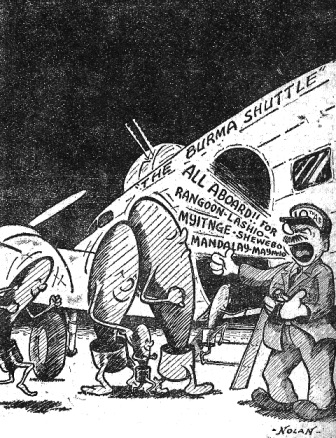
VOL. I NO. 24 REG. NO. L5015 DELHI, THURSDAY FEBRUARY 25, 1943.
|
FIGHTER PLANES LEAD WEEK’S RAIDS AGAINST JAPS IN BURMA By Corp. ROGER L. WHEELER Roundup Staff Correspondent Fighter planes played the important roles as the Tenth Air Force put on another aerial show over Japanese-occupied Burma this week. Carrying light bombs and Machine-guns, the fighters swarmed over their appointed targets in one formation after another to score accurately and effectively on the enemy. Bombers made their presence felt, too, concentrating most attention on railroad rolling stock. Fighter planes armed with machine-guns and light bombs attacked enemy installations and motor vehicles in northern Burma on Feb. 15, leaving heavy casualties and loss of supplies to the enemy. The first of three formations of fighters strafed 20 trucks loaded with bridge equipment on the road south of Hpunginzup. Another formation found 20 additional trucks in a parking area near Hpunginzup and reported direct hits among them. Hpunginzup itself was subjected to low level attacks which resulted in great damage from four large fires. The third formation concentrated on Japanese headquarters at Nsopzup where large numbers of troops were quartered. Bombers attacked railroad rolling stock at Ywataung in central Burma on Feb. 18, while fighters attacked enemy headquarters at Maingkwan. Another formation of fighters on the same day observed and made a low level attack on a concentration of enemy troops north of Taro while a third formation strafed and burned sheds where many rafts were being built at Mezalican on the Irrawaddy River. As a result of these attacks it is believed that the enemy has been forced to utilize rafts on the rivers because of damage to his rail communications. Fighter planes resumed their attacks on Feb. 19, top strike at a Japanese headquarters at Hupinginka and near hits were made from an attack on a new bridge there. As a result of these strafings, enemy anti-aircraft fire was silenced and many hits on buildings in the town were seen. West of Meza another formation dropped bombs along a defile through which the railroad passes causing landslides and burying the tracks to an estimated depth of 20 feet for a distance of 100 feet. In central Burma, on Feb. 19, bombers attacked rolling stock and railroad installations at Sagaing, scoring direct hits and near misses. No personnel or aircraft casualties were sustained on any of these operations. Our fighters again struck heavily on Feb. 20 when they made an attack in force against an enemy headquarters at Sahmaw in northern Burma. Buildings, barracks, oil tanks, and railroad installations were destroyed or severely damaged and more than thirty fires were seen to be burning when the planes turned back toward their base. Another formation of our fighters attacked the railroad defile near Meza where tools and equipment assembled to clear the rail line were strafed, and hits were secured on a locomotive standing south of the cut. A cavalry station near Kamaing was also subjected to low-level attack and Japanese cavalrymen were seen to dash for cover, abandoning their stampeding horses. |
BALTIMORE - (UP) - Reports that Donald M. Nelson will be replaced as U.S. War Production chief continue to receive wide circulation.
Observers attached particular significance to Nelson's plea for national unity, during a recent address here before the National Conference of Christians and Jews, as the WPB continued to struggle to prevent the Army from succeeding in its efforts to control armament production.
Nelson told the conference: "We still have a big job and much hard work to do. Before many months we shall have enough production to smother the Axis. Of that I am sure."
Almost simultaneous with Nelson's optimistic forecasts, Democratic Senator Harley Kilgore, speaking in Chicago, expressed "great doubt" that President Roosevelt's production goals for 1943 would be met. Kilgore charged that the war mobilization program was suffering from a lack of coordination.
|
Eberstadt Dismissed From Production Job By Donald Nelson WASHINGTON - (UP) - At the request of Donald Nelson, chief of the War Production Board, Ferdinand Eberstadt has been replaced by Charles B. Wilson as Executive Vice-Chairman in charge of all WPB programs. Capitol observers consider Eberstadt's dismissal as the latest casualty in the struggle between the WPB and the armed services over control of war production, since Eberstadt repeatedly made unnecessary demands on civilian economy while controlling allocation of scarce material. Nelson said the dismissal of Eberstadt will "bring harmony." Likewise, Lou Holland resigned as chairman of the Smaller War Parts Corporation. His successor, Col. Robert Johnson, told newsmen his primary duty will be to spread contracts among small plants, despite possible conflicts with Army superiors. |
The Senator, recalling that when war was declared, the President had established plane production goals of 60,000 planes for 1942 and 125,000 for 1943, said: "We did not meet the 1942 goals. I think there is little doubt we shall not meet the 1943 goals. In fact, they have already been lowered, and there is great doubt whether we shall reach the reduced goals."
Meanwhile, the White House made this statement through Presidential secretary William D. Hasset: "Published statements that prominent persons have urged the President to remove Donald M. Nelson as War Production Board chairman are absolutely untrue."
Nelson himself has denied that he is planning to resign. Should Nelson be deposed, Bernard Baruch, who held a similar post in World War I, is considered a possible successor.
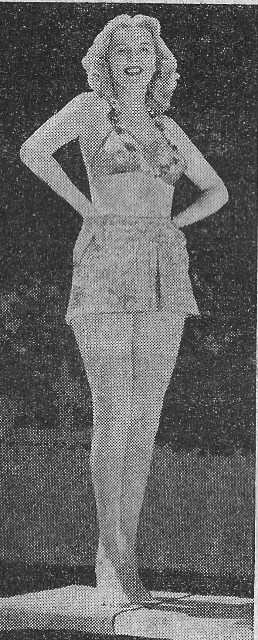 Dolores Moran, 17 and blonde, got a turkey wishbone at an Elks picnic. She wished she could be a movie actress. Then she met a talent scout,
then she met a screen test, then she met a movie contract. She still has the wishbone, too.
Dolores Moran, 17 and blonde, got a turkey wishbone at an Elks picnic. She wished she could be a movie actress. Then she met a talent scout,
then she met a screen test, then she met a movie contract. She still has the wishbone, too.
|
MADAME CHIANG SPEAKS BEFORE U.S. CONGRESS
WASHINGTON - Madame Chiang Kai-shek became the second woman in history to address a joint session of the United States Congress - the first being Queen Wilhelmina - and warned of the power of Japan:
"Let us not forget that Japan in her occupied areas today has greater resources at her command than Germany, that the longer Japan is left in undisputed possession of these resources the stronger she must become. The peril of the Japanese juggernaut remains. Japanese military might must be decimated as a fighting force before its threat to civilization is removed."
Madame Chiang was welcomed personally by the President and Mrs. Roosevelt.
WAR CORRESPONDENTS’ CASUALTY LIST HIGH
NEW YORK - (UP) - Casualty rate among United States war correspondents is three to four times as great in proportion to Army casualties.
Sixty correspondents out of 300 to 350 are either casualties or Axis prisoners, while the ratio of Army losses was less than 5 percent prior to February.
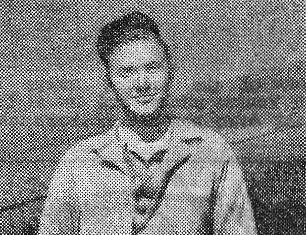
|
In Meeting With Jap Zero Plane
By S/Sgt. JOHN E. CHAPMAN
Lady Luck was riding beside S/Sgt. Thomas H. Cave, combat photographer for this medium bombardment squadron of the CATF during a mission over Canton, China.
Everything was clicking perfectly following the laying of the eggs on the target and Cave was standing at his customary spot shooting pictures of the bombing results as the plane banked into the turn.
At this precise moment three Jap "Zeros" were spotted on the tail of the plane. Before he knew what was happening, Cave went spinning across the width of the ship, paralyzed stiffer than a bride's first batch of biscuits. After evasive action had permitted the plane to elude the Japs, examination by other members of the crew revealed that the good photographer had that part of his anatomy referred to in the better circles as "posterior appendum" grazed by the enemy's slug without even scratching the skin of Cave's . . .
GOOD LUCK CHARM
Ever since his rendezvous with Miss Luck, which, incidentally, is being widely circulated in the States by America's two largest news gathering agencies. S/Sgt. Cave has been wearing the lead slug around his neck as a good luck charm.
Other members of the crew on this raid were Capt. Robert V. Ford, pilot; 1st Lt. Franklin F. Young, co-pilot; 1st Lt. Glee G. Smyth, navigator; 2nd Lt. Lt. Thomas E. Drawhorn, Jr., bombardier; T/Sgt. S. O. McGlauglin, engineer and S/Sgt. Samuel O. Koval, radio operator.
This outfit claims to have as a member of its staff the man with the longest continuous service in China in the person of Corp. Chester H. Weycker, of Los Angeles, Calif. Weycker has been a "citizen" of China since April 11, 1942. If any other outfit in the CATF has an aspirant to the title with longer continuous service let's hear from you.
China is not known as the land of courtesy for nothing. Last week the Chinese Women's Comfort Society equipped the officers'
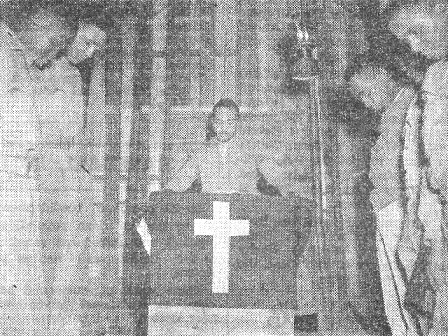 Capt. Robert F. Harrington, chaplain of engineers' company in Assam, conducts church service in the "Bamboo Inn," which has become general
meeting place for the men of that outfit.
Capt. Robert F. Harrington, chaplain of engineers' company in Assam, conducts church service in the "Bamboo Inn," which has become general
meeting place for the men of that outfit.
|
SHOULD BE LINGUISTS
If the members of the outfit aren't accomplished Chinese linguists in a very short time it won't be the fault of Lt. William J. Yao of the Chinese Interpreter Section attached to the China Air Task Force. Yao, who attended St. John's University in Shanghai, is devoting his spare time to a study - of all things - Culbertson contract bridge.
One of the most recent additions to this outfit's establishment is a "coffee shoppe" which celebrated its gala opening recently by passing out free java and doughnuts to all comers. The "shoppe" is under the management of T/Sgt. Adam R. Williams, thrice-decorated engineer-gunner (Distinguished Flying Cross, Purple Heart, and Silver Star: Roundup January 21, 1943). After a diet of what the Chinese call coffee, this comes as a welcome relief to all the boys. Through the co-operation of Lt. Ralph S. Jordan, T/Sgt. Edmond L. Davis and their boys in the communication section, Williams is providing swing music, news, market reports, and what have you to his customers via a direct radio set-up with the communication shack . . . All we lack now is the morning newspaper and rumor has it that Williams is working on that too!
|
OWI REPORTS TOTAL WAR CASUALTIES WASHINGTON - The Office of War Information announced that the total casualties of the United States armed services totaled 65.380. The figure includes 10,150 dead, 10,959 wounded, 38,049 missing, 6,132 prisoners and 90 interned in neutral countries. The Army's list, complete through Feb. 7, totaled 41,948, including 3,533 dead, 6,509 wounded, 25,684 missing, 6,132 prisoners and 90 interned. Of the wounded, 743 have already returned to active duty. The Navy, Marines and Coast Guard list, complete through Feb. 19, except where the next of kin is still being notified, totals 23,432. Navy casualties include: 5,083 dead, 2,087 wounded and 10,197 missing. Marines, 1,483 dead, 2,344 wounded and 1,994 missing. Coast Guard, 51 dead, 19 wounded and 174 missing. |
AMERICAN FIGHTERS BETTER
THAN ZERO, ARNOLD DECLARES
WASHINGTON - The War Department announced that Lieut. Gen. Henry H. Arnold, Chief of U.S. Army Air Forces, has returned from a 35,000-mile flight through the combat theaters of North Africa, the Middle East, India and China.
General Arnold said that the morale of the American airmen on the fighting fronts was high and reported that comparative tests made over China between the most modern captured Japanese Zero planes and American fighters "exploded the theory that the Zero is a super plane."
"It has maneuverability due to its light construction but lacks ruggedness," Arnold said. "It has firepower and protective armorplate, but our planes will climb with it and have a greater top speed and greater diving speed."
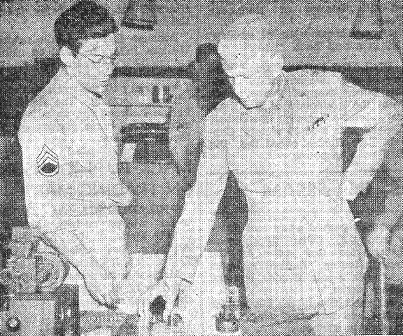 Lieut. Gen. Brehon Somervell and S/Sgt. Charles Hienrich, of the Signal Section at a port base, discuss problems in maintenance of motion
picture projectors during the SOS Chief's recent inspection tour there.
Lieut. Gen. Brehon Somervell and S/Sgt. Charles Hienrich, of the Signal Section at a port base, discuss problems in maintenance of motion
picture projectors during the SOS Chief's recent inspection tour there.
|
Supplies For India
Come Satisfactorily,
Says Somervell
WASHINGTON - Returning from a 34,000-mile trip to North Africa, the Middle East and India, Lieut. Gen. Brehon Somervell, Chief of the U.S. Army Services of Supply, told a press conference here that fighting forces in those areas are getting ample supplies of food and ammunition.
Somervell said that there was enough material accumulating on those fronts to handle a large offensive. He denied that inadequate and ineffective supplies were responsible for the reverses in central Tunisia, declaring: "That is just a temporary success for the Germans and should not be given undue significance."
The Supply Chief told the newsmen that the French had sunk 27 ships in Oran harbor, but that these were being cleared up.
Commenting on his visit to India, Somervell said that transport of war materials and supplies was progressing satisfactorily.
Somervell revealed that 52 percent of the supplies required by American troops in India were being obtained locally.

|
Americans Compete
In All-India Boxing
Leather-tossers from two central India cities are representing American forces in the All-India Boxing Tournament at Lahore, which started yesterday and will continue through Saturday.
Six scrappers will represent one city in the fistivities, sponsored by the Burt Institute. They are: Pvt. Felix Thomas, 135-pounds; Pfc. Rudy Guerra and Pvt. Harold Ratliff, 147-pounds; Corp. Walter Kowalski, 160-pounds; Pvt. William Daufen, 200-pounds; and Pfc. Kenny Swan, open. Swan is captain and coach.
Air depot representatives from the other city are Pvt. Ernie Aguirre, S/Sgt. Godfrey Darby and Pfc. James (Chief) Door, the latter a Crow Indian.
|
|
To the complete bewilderment of the non-American population, baseball was introduced recently to the British and natives in Assam.
There were no peanuts and hot dogs, no traditional "seventh-inning stretch," and no demands - well, not many - to "moider that blind umpire," yet a typical game of Abner Doubleday's sport was played.
On the appointed afternoon, the two teams met on an expansive field in the shadows of the Himalayas.
For a while it looked like a shoo-in for a team comprised of members of an anti-aircraft unit. With Hernandez poling a homerun with two mates aboard, the ack-ackers piled up a 6-0 lead off Pitcher Cooper.
But the team composed of air corps lads pecked away and finally won 8-6, when they broke through for four runs in the seventh inning. Endicott's single, driving in a pair of runs, was the payoff punch.
Interpretation of the happenings on the field was made over a public address system.
The British reciprocated by staging a tea party for the members of both teams following the game.
G.I. Baseball League Opens For 16 Teams
First-round schedule of a 16-team baseball series, divided into American and National Leagues, has started at Karachi.
The teams will play twice weekly. The first round will end on March 10, and a second and final round will be announced later. Area playoffs between the two league winners will determine the championship.
A trophy will be awarded the winner and personal awards will be presented members of the winning team.
TWO QUINTETS SHARING LEAD IN CHINA LOOP
With three victories each in as many times on the court, Ferry Command and bomber squadron teams are top dogs in the basketball tournament now being played in the China theater.
The bomber squadron's most recent success was a 35-24 victory over S.O.S., with Lee piling up the largest individual score of the tourney when he meshed 16 points.
Ferry Command rolled over a station hospital quintet, 19-7. Verba of the Pillrollers - leading scorer of the tourney with 32 points - contributed his team's entire seven markers.
Notes on other games: HQ five fought off a desperate rally to top a squadron team, 21-17, with Sgt. Varney's defensive work outstanding . . Another squadron team built up a 16-3 halftime lead and went on to win a 27-6 decision over a service outfit. Sgt. Crabtree was a 10-point scorer . . HQ piled up a 10-0 lead over the league-leading bomber squadron, only to be nipped at the wire, 21-20. Broughton scored 11 points for the winners . . S.O.S. was driven deeper into the cellar, 26-13 victim of a service team. Krammer, playing his first game, scored 12 points . . Ferry Command was 33-9 winner over a squadron quintet . . Verba scored 15 points as the Pillrollers walloped a squadron team, 38-22.
 BY S/SGT. JACK NOLAN
BY S/SGT. JACK NOLAN

V-MAIL PROVES ITS ADVANTAGE
WASHINGTON - The War Department, reporting the advantages of overseas "V"-mail, said that a Canada-bound RAF plane crashed in Newfoundland recently and destroyed 32 rolls of "V"-mail film with 50,000 letters from American soldiers in England to the United States.
Under the "V"-mail system of holding the original letters at the point of dispatch until the film arrived safely overseas, it was possible to reproduce the recent letters.
The report said that more than 20,000,000 pieces of "V"-mail had already been handled by the Army Postal Service without losses.
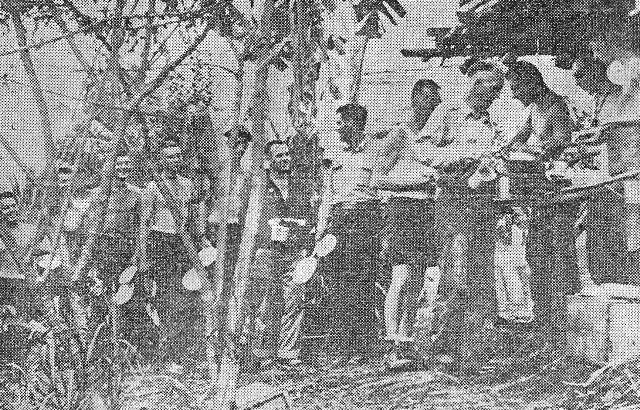 A general has to line up for his chow on some occasions. At the head of this line getting his handout of Army field chow at a bivouac
id Brig. Gen. Hanford MacNaider, who commanded one of the U.S. Army task forces in New Guinea.
A general has to line up for his chow on some occasions. At the head of this line getting his handout of Army field chow at a bivouac
id Brig. Gen. Hanford MacNaider, who commanded one of the U.S. Army task forces in New Guinea.
|
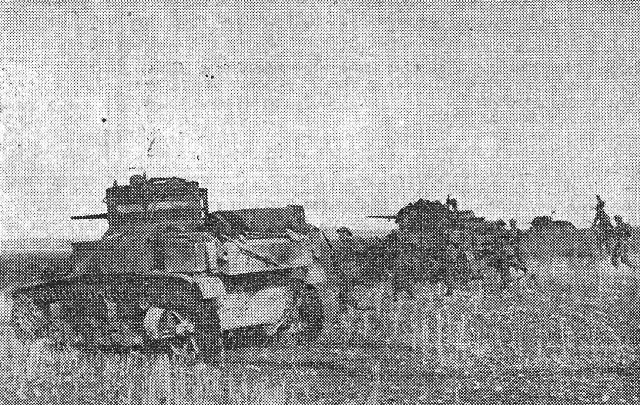 British soldiers supported by U.S. tanks, advance to new positions in the Allied drive against the Axis in Tunisia. The Germans have put up
much more resistance than they were expected to display on this front. Rains also hampered Allies.
British soldiers supported by U.S. tanks, advance to new positions in the Allied drive against the Axis in Tunisia. The Germans have put up
much more resistance than they were expected to display on this front. Rains also hampered Allies.
|
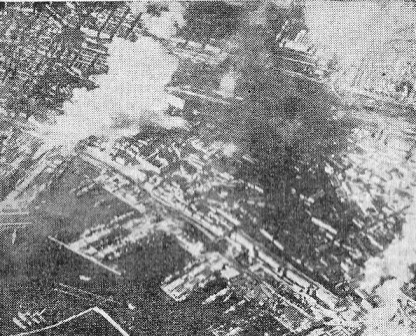 Dock installations at Naples, Italy feel the impact of U.S. bombs during an attack by American bombers.
Heavy anti-aircraft fire and fighter planes did not mar the accuracy of the attack, shown by rising columns of smoke from dock area.
Dock installations at Naples, Italy feel the impact of U.S. bombs during an attack by American bombers.
Heavy anti-aircraft fire and fighter planes did not mar the accuracy of the attack, shown by rising columns of smoke from dock area.
|
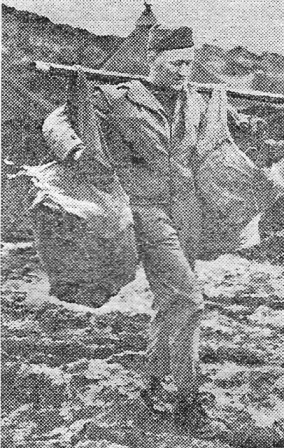 U.S. airmen battle difficult weather conditions, besides Japs in the Aleutians.
Here, a soldier, carrying tent stakes, splashes through mud.
U.S. airmen battle difficult weather conditions, besides Japs in the Aleutians.
Here, a soldier, carrying tent stakes, splashes through mud.
|
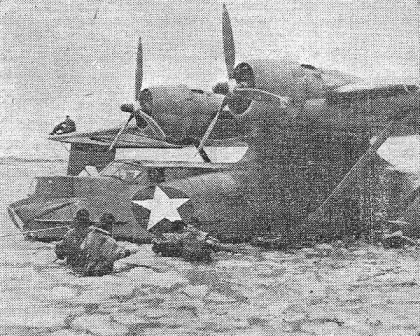 Wading into icy water is just part of a day's work for this U.S. Navy ground crew whose job it is to keep PBY patrol bombers flying over
Alaskan waters. The craft is maneuvered ashore by the pilot, whose head appears just above the star.
Wading into icy water is just part of a day's work for this U.S. Navy ground crew whose job it is to keep PBY patrol bombers flying over
Alaskan waters. The craft is maneuvered ashore by the pilot, whose head appears just above the star.
|
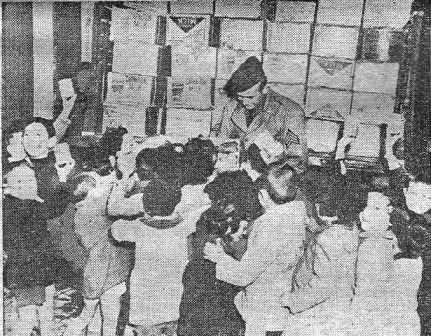 Eager hands of French children reach out for cans of condensed milk being distributed by an Army sergeant in Algeria.
Allied forces have also made available a quantity of powdered milk to be distributed to children in North Africa.
Eager hands of French children reach out for cans of condensed milk being distributed by an Army sergeant in Algeria.
Allied forces have also made available a quantity of powdered milk to be distributed to children in North Africa.
|
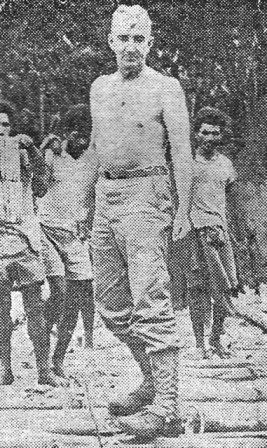 Lieut. Gen. Robert L. Eichelberger, commander of U.S. ground forces in New Guinea, inspects carriers bringing supplies to the front.
Lieut. Gen. Robert L. Eichelberger, commander of U.S. ground forces in New Guinea, inspects carriers bringing supplies to the front.
|
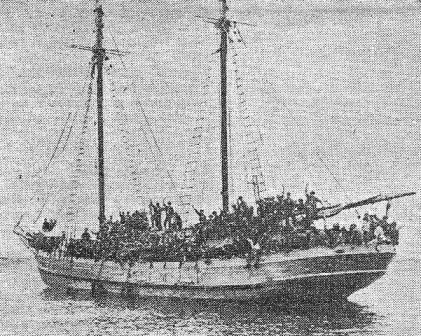 Pressing into service every kind of marine transport, U.S. soldiers arrive at a New Guinea port in a wooden schooner.
Shipping for troops and supplies has been one of the most acute problems for the Allies to solve.
Pressing into service every kind of marine transport, U.S. soldiers arrive at a New Guinea port in a wooden schooner.
Shipping for troops and supplies has been one of the most acute problems for the Allies to solve.
|
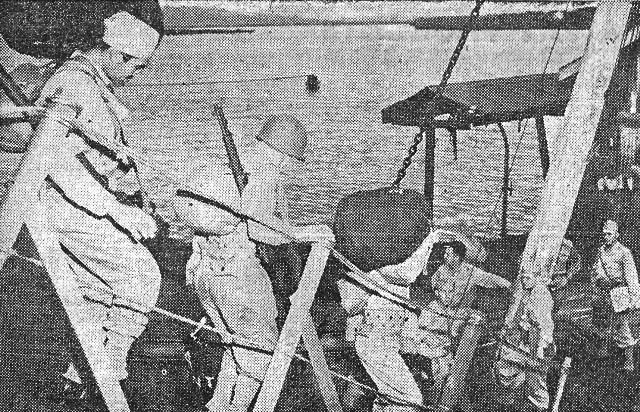 Carrying their duffle bags, members of a U.S. Army task force land from their transport on the Fiji Islands in the South Pacific.
These troops are now entrenched on this heretofore unfortified base and are now ready for the call that will send them into what might
wide-scope action on this battlefront.
Carrying their duffle bags, members of a U.S. Army task force land from their transport on the Fiji Islands in the South Pacific.
These troops are now entrenched on this heretofore unfortified base and are now ready for the call that will send them into what might
wide-scope action on this battlefront.
|
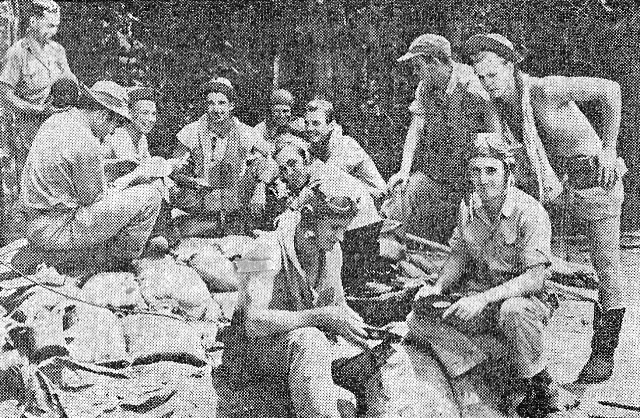 Relaxing between combat missions, U.S. Army fliers, who played an important role in supporting Australian and American ground forces
in New Guinea, bask in the sun. Phonograph recordings and a card game pass the time as they wait their next call for aerial action.
Relaxing between combat missions, U.S. Army fliers, who played an important role in supporting Australian and American ground forces
in New Guinea, bask in the sun. Phonograph recordings and a card game pass the time as they wait their next call for aerial action.
|
Few Adjectives Can Describe Tough Job of Repair Crews
By T/SGT. WILLIAM P. LORD
Tucked away on one edge of a Chinese graveyard is a little mud shack and two mud hangers from which operate one of the hardest working crews in this war. Aero Repair at home could be considered a hard assignment, but operating under China's imposed conditions, there are few adjectives that can describe it. Working with limited tools, equipment, and personnel, Line Chief William H. Casto is on the ball - "Keeping 'Em Flying." Engine changes, sheet metal work, 50 hour inspections, and all types of third echelon work is done. This doesn't count picking up the ships that come in on their bellies. It could have been two o'clock one morning that a DC couldn't get her wheels down, and the boys forsaked their warm bunks to get the pieces off the runway or a rainy day during the monsoon when a bomber looked like a big ball of mud due to a hole in the hydraulic system of her landing gear.
S/Sgt. John D. Miller is the "No. 2" ramrod, with S/Sgt. A. R. Dye making parts and putting a lathe through paces heretofore unknown. Shark-teethed fighters that come home with an elevator or airlion shot off have their anatomy carefully bandaged with "sterilized" aluminum at the hands of S/Sgt. Rich M. Porter and S/Sgt. W. E. Browning. When it comes to welding things together, Sgt. Curtis Nelson and Pvt. R. D. Ashford have the edge on all concerned.
NOT STOPPED YET
A stray slug or piece of scrap iron floating through the air can do a lot of damage to an electrical system, but S/Sgt. H. A. Barksdale and Cpl. Paul Sereg haven't been stopped yet. The hearts of many bucktoothed ra's of Nippon have almost stopped when they looked out across the blue and saw the open jaws of a Tiger Shark coming at them. Chances are good that Cpl. J. B. Sutton did the paint job.
Though space doesn't permit personal mention, homage must be paid to those grease monkeys who catch all the jobs that are beneath the dignity of the specialists. Doing the jobs from 'safety wiring' to engine 'run up' they are all good men.
Back in the days when we 'wuz at Hamilton, Barksdale, Chanute, Kelly and all those fields, the word came in once in a while that a ship was down and the boys would get out the ol' "C-2" and after a little drive down a paved highway and a short trek in the woods, the ship was loaded and brought home in a day or two. Lads, may I tell you that story is quite different here? As your correspondent pecks away at "Miss Jezzebelle 'Corona'," there sits on his bunk a man with a ten days growth of beard and a slightly haggard look. A ship was down, only this one was in China, and it took a little longer than a couple of days to get it home. Once in a while, the Keepers of Good Fortune frown on pilot and plane and someone has to walk home. But though he did not bring his ship home with him, there appears a long story of the thrilling adventures and strange sights encountered along the way home. Now begins the story of Aero Repair!
MODIFIED CHEVE
A four-by-four Cheve (Chevy), modified with two pieces of railroad track, and a semi-job, evacuated out of Burma, takes the place of the C-2 crash wagon. Planks and timbers (to make bridges), shovels and axes (to make roads), a Chinese interpreter, tool boxes, and grease monkeys all go to make up the cargo. Roads in China were built for horse and Caribou carts not semi-trailers - thus the way has to be cleared and streams bridged. Fifty miles a day is good traveling under general circumstances. Always there are mountains and more mountains! When going through the high passes, the fog may be so thick that visibility is limited to 20 feet. As civilization is left behind, strange tribes are seen and though the towns are only half a mile apart the dress and language is completely different. In the mud "fongtzes," humanity and animals live as one. Disease, filth, and illiteracy are paramount. Though all this is interesting to a tourist, the salvage crew is tired and cold and have seen it enough already.
Day after day and cold night after cold night, it goes on. Rice, bean sprouts, garlic, and green tea until they wish airplanes had never been invented. Cutting down trees, bridging ditches, moving rocks and they begin to wish trucks had never been invented. But finally and at long last, the ship is found - the loose pieces picked up, the whole works disassembled and loaded. Comes now the trip back with the Cheve top heavy and tail heavy with both wing sections, the semi reeling and rocking with the fuselage. The reader's imagination is invited to the sensations experienced going through a high pass with the fog so thick and the embankment so deep that the next stop is out of sight, and the top heavy truck
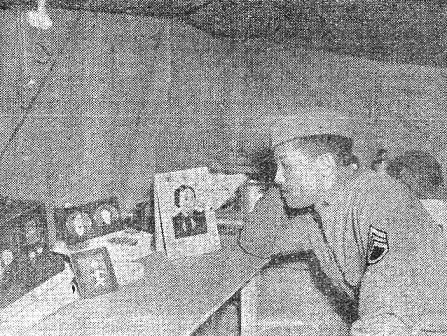 S/Sgt. James J. Fraser, member of a medical detachment serving with an engineers' company is Assam, gazes longingly at pictures of his wife
and family and thinks about the day when he'll return home.
S/Sgt. James J. Fraser, member of a medical detachment serving with an engineers' company is Assam, gazes longingly at pictures of his wife
and family and thinks about the day when he'll return home.
|
KEEPS WAISTLINE DOWN
All the foregoing about the truck and transportation difficulties are foregone if the skipper bailed out and the ship burned. All you have to do then is to park the truck at the nearest civilization, get some horses and ride over the mountains and ride over the mountains and ride over some more mountains. An exercise which the best of physical culturists tell you will keep down that 'past 40 waistline,' but that trim 29 doesn't help frozen feet any.
Now you have it. The story of Aero Repair, Air Service Command, China Air Task Force. Not as heroic as flying the planes they service and most probably none of them will go home bemedalled, but when credit is given where credit is due, they "Keep 'Em Flying."
TAILWHEELS - Sgt. Albert G. Kacenas leaves the outfit for fighter squadron duty. Good luck to him in the new outfit - T/Sgt. Francis Yee plays hell with the civilian truck mechanics in their own language - After all these years Andy M. Clark sews on two stripes - T/Sgt. Richard W. Harris is passing cigars over seven pounds and nine ounces of young manhood - Maj. (newly made) Richard D. Carr says it is all right for a company officer to chew tobacco, but it is beneath the dignity of 'us' Field Officers. So now the major smokes cigars.
‘HOMING’ IS MAIN TOPIC FOR DISCUSSION AT BOMB BASE
By Pvt. CHARLIE EARTZ
Like some other of your amateur correspondents, I have discovered that the reason this bombardment group has been on the outside of the Roundup is that no one writes for the inside. We have lots of talent but an awful shortage of ambition. However if you overlook the talent on my behalf, possibly my small amount of correspondence will give the readers some idea of us.
We live over here in the rice country a long way from the Red Cross Service Club in Delhi; though we do have a building with a large red cross on it. In one section you can get the itch painted with iodine or a finger bandaged and in the other section (horrors) you do get your teeth extracted. In sincerity we do have a reading room with a library, all kinds of games, music and a good place to lounge around and take it easy. Thanks a million to the American Red Cross.
Imagine the surprise or should I say which way do you think the cogs were turning when the message center received the following wires with a half-hour interval?
1. "Necrason to Watkins rush by first available transportation CMA Red Cross nurse."
2. "Send to PRN Watkins from Necrason PRN one inner spring mattress."
Perhaps the officers involved have an explanation who knows.
I realize it isn't a football game we are playing but I wonder if the "wing over formation" has as their theme song, "Take out That Bridge." The combat teams have done a lot of good work as you can see, in the past issues of Roundup, of our success but that bridge has the magic finger. Our organization has (homing) difficulties that everyone has a different version on. The year stuff has long ago past, of course some say time don't start until you touch India but nevertheless time nearly ended on Dec. 7, 1942, when we were half way between Honolulu and the Fiji Islands. A lot of our friends who were in our group that went to Java and then returned to Australia are sending their love from the U.S.A. Of course we hope Washington thinks of a nice place to send us during the rainy season.
|
G.I.’s Get Load Off Chests
Via Letters To Editor
Roundup Editor:
In your last issue of the Roundup, you mentioned the boys of the air service depot not receiving any ratings. Since the beef has started we men of the Medical Department have one also.
Some men have left the states as Pvts. and went up the ladder just as easy as ABC in the Air Corps, but men in the medics, leaving the states the same time as Pvts. are still Pvts. Most of us fellows here have been overseas now for 15 months and believe that we are the oldest outfit out here. Mind you don't get us wrong and think that we are not good sports, but don't you think that three years is a long time to be a private?
Word has gotten around that a new T.O. is now in effect for the medical corps, but that was about three months ago. Have you seen or heard of it? Most of us fellows are all of the bomb group that left the states together and not have we only stuck together, but we have not advanced in grade either. We do not blame our medical officer because we all know he has helped us every way possible, but we do believe we deserve a little consideration from Tenth Air Force, New Delhi.
Since the Roundup is helping the air depot to get some ratings and Pfc. Marvin Collins some teeth, try and see what you can do for us. - Corp. Marvin Braun.
Roundup Editor:
Undoubtedly the trials and tribulations of the soldier are very well known to you. Here is one that in case you have missed, you can add to your list.
Having been dutiful children we were very careful to act upon the advice given us by our parents. This advice was to always include in our diets large quantities of the fermented juice of malt and hops, namely beer. For many years this was done by us very faithfully.
Something has happened to unbalance out diets. In the last seven months we have only been rationed the puny amount of five cans of the aforementioned juice. You can well imagine how hurt our parents would be if they knew how neglectful we are acting upon their well meaning advice.
We have thought that the well educated dieticians of the present date had excluded this luscious beverage from our diet because it was harmful to us, but the reminders and pictures in the last few issues of your much looked for Roundup have shown us that this is not so. Does the fact that we aren't stationed right at the receiving point of this delicious nectar exclude us from being rationed a fair proportion? If so please let us know definitely so that we can turn our lines of thought and dreams into another channel.
That is all we can say to let you know that we are still trying our best to follow the advice given us by folks wiser than us so many years ago. We sincerely hope that you can help us get this fluid that is so beneficial to our simple way of living.
Respectfully, The Five Must-get-beers.
Two’s Company But Five (Cats) Is A Crowd
By Corp. EDDIE PHILLIPS
Soon after Sgt. Ray Oden had returned to his quarters at Karachi following an evening of fun and frolic along the local gay white way (O.K., so it ain't white), his slumbers were rudely interrupted (he had just lulled himself to sleep, too, by counting Blue Ribbon beer cans leaping over his favorite bar) by an odd sound which seemed to be emanating from his "A" Bag, or his "B" Bag - it's not important which. What is important is that upon investigating in the dark (figuratively and literally), his gaze encountered five pairs of eyes.
Oden, perturbed, closed one eye and counted to 10, opened that eye and closed the other orb - "10" again. Let's see, he thought, 10 and 10 are 20, now what makes a noise like that and has 20 eyes besides 10 cobras? Oden shuddered. He could almost see them, twisting, writhing - pink, green, yellow and purple - and not a thing left in the house for snake bites either.
He fumbled for the light switch. The lights blinked. Oden blinked. Now it is generally conceded that every cat has nine lives, but this is the story of a cat that had four extra lives - and "had" them in Oden's barracks bag. For there, like a queen, in a blue denim maternity ward lay the proudest and most devoted feline mater Oden had ever seen. Close alongside were Harry, Oscar, Elmer and Florence - all very recent additions to the clan. "She" eyed Oden with a saucy grin - as much as to intimate, "If you don't like this, brother, you can blow it out your barracks bag."
Oden's eyes were wide open by this time - but not Harry's, Oscar's, Elmer's or Florence's. "I've seen rabbits pulled out of a hat," said Oden, "and I've seen some damn funny things come out of a barracks bag in my time, but this . . . What happened in my room tonight, shouldn't happen to a dog!"
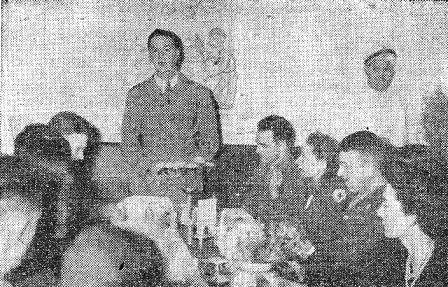 Lieut. Shy Greenspan answers the call for a speech at a recent party given by his pals on the occasion of his promotion from
technical sergeant.
Lieut. Shy Greenspan answers the call for a speech at a recent party given by his pals on the occasion of his promotion from
technical sergeant.
|
SOLDIERS PAY RANSOM
FOR RAF FLIERS
By CORP. W. D. TRIGG
Excitement recently found a breeding ground at this fighter squadron base, two British fliers, forced to swim after spinning in from 2,000 feet, were dragged up on shore by an ominous looking group of Indians from a nearby village. The fliers managed to get a message through to this base and a rescue party was formed immediately.
All were eager to go and who could blame them. This should be good for a silver star at the least! Preparations were made and rescue party departed. In this were Sgts. Beggs and Casner, Corps. Holder and Randall, and Pvts. Lindsay, Bankston and Reynolds. They knew not what they faced in the way of danger but they ventured forth unafraid and undaunted.
Five minutes went by, then ten, then they arrived. The natives were barbarous and mercenary to boot, and would surrender the fliers for 100 rupees no less! Nerves were tense, what to do - shoot it out or leave the fliers to a horrible fate?
A consultation was held with the natives and after nerve-racking negotiations were made, the fliers were returned to the rescue party for a ransom of five rupees and two American cigarettes.
The party returned home approximately 30 minutes from the time they started on their perilous mission and were received warmly by the dispensary and the mess hall. Another great step had been accomplished in the squadron's hall of fame and it was felt in these quarters that such service accomplished without hesitation in the face of such unalterable odds deserves acclaim.
The day room has taken on the appearance of a hotel lounge since the Red Cross did a little paper hanging and furniture pushing last week and it is very much appreciated by this detachment. The ping-pong tournament is going right along and stiff necks are in abundance from trying to follow the speedy path of the little white pill.
The detachment welcomes a new C.O. this week, Maj. George W. Hazlett. He is replacing Maj. Harry B. Young. Corp. Edson, so unwittingly omitted in last week's ditty, must come into his own this time. He is responsible in a typewriting sort of way for the officers' getting paid. Official title - Administration Clerk, height 5' 8", weight 220 lbs., bone dry, born in Minnesota and nobody seems to know why. S'be it.
This detachment has been blessed with a swell mess hall, and appropriate mess sergeant and cooks to go with it. Never left the mess hall yet without an overstuffed stomach and the credit for all this most richly goes to Mess Sgt. Cimperman, and his staff of cooks, Sgt. Holper, Corps. Miller, Brown, Huitt, Ackerman, Henneberger and Pvts. Bankston and Galloway taking lessons from the foregoing while Corp. Buhs holds down the butchering dept.
Increased Aid For China Seen After North African Victory
By RAYMOND CLAPPER
WASHINGTON - China is essential in our scheme for defeating Japan. Without co-operation from China, any plan for a military victory over Japan would be seriously weakened. Likewise, China is important to us in any arrangement for security in the Pacific after the war.
The extent of our interest in China was registered for all time when we refused to sell her out to Japan before Pearl Harbor. We tool the risk of war with Japan rather than agree to proposals from Tokyo that would have left China a slave to Japan. We took the side of China not out of kindness of heart but because the safety of the United States would have been jeopardized by allowing Japan to become supreme in the Orient.
Those facts should be sufficient to prove to some discouraged Chinese that the United States has every interest, now and in the
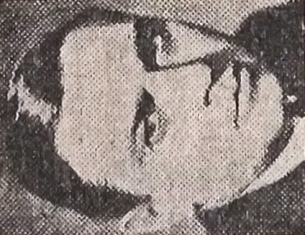
|
Madame Chiang Kai-shek's appearance before Congress drew a national ovation, and undoubtedly some in Congress may be moved to demand that more aid go to China. Such suggestions have already been heard during the Lend-Lease hearing, which showed pitifully little help to China compared with England and Russia. There is no reason, however, to allow enthusiasm for our sturdy friends to throw us out of balance. Demands for changes in program can cause confusion but are not apt to affect our plans. After the recent Churchill speech in which he said the plan was to defeat Germany first and then turn to Japan, some criticism was heard in this country. President Roosevelt, in his address on Lincoln's Birthday, undertook to soften that criticism by saying that our policy toward our Japanese enemies was the same as our policy toward our Nazi enemies - the policy of fighting hard on all fronts and winning the war as soon as we can.
But the fact is that we can do little in China until we have sea and air routes into that country. We cannot even do a large-scale bombing job without having the ground transportation by which to move in gasoline and bombs. Although bombing must be heavy and persistent to be effective, we will try anyway to do what we can, including such bombing as we can on the present basis of using air supply lines.
Yet it is clear that real help to China waits first of all on winning in North Africa. The North African campaign promises to open the Mediterranean within a short time. Then Allied ships can carry supplies through the Indian Ocean without the long crawl around the bottom of Africa. Thus the campaign to reopen the Burma Road is a less remote possibility than it was before the North
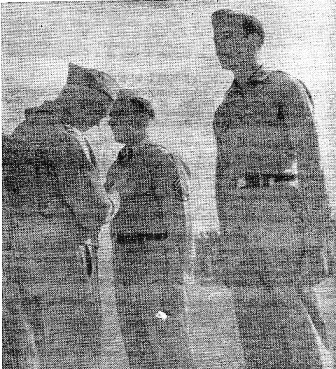 Visiting an air base of the India Air Task Force, Lieut. Gen. H. H. Arnold personally pins an Air Medal on T/Sgt. F. A. Gates.
Also honored was T/Sgt. M. M. Hatelburg. Both are members of a bomber outfit that has seen service over the Middle East, Burma,
India, China and Siam, among other places.
Visiting an air base of the India Air Task Force, Lieut. Gen. H. H. Arnold personally pins an Air Medal on T/Sgt. F. A. Gates.
Also honored was T/Sgt. M. M. Hatelburg. Both are members of a bomber outfit that has seen service over the Middle East, Burma,
India, China and Siam, among other places.
|
AHEAD OF SUPPLIES
The comparatively easy occupation of North Africa misled many into thinking that it would be easy to push the Germans out of Tunisia. We had favorable breaks in going ashore. Gen. Eisenhower almost got to Tunis in the first sprint. There it was, almost before his eyes, with only a small number of Axis troops holding. But the Americans had raced ahead of their supplies by several days and had to wait for them to catch up. During that wait the winter rains began.
That ended the hope of immediate action. We had to dig in, and Germany gained time in which to ferry her army across the Mediteranean. Any chance of getting North Africa without a hard fight vanished forever. Now that hard fight has begun.
No other claims will have priority until the battle for North Africa is over. That is why China needs to be patient a little while longer.
Special Lend-Lease Division For China
WASHINGTON - The creation of a China Division of the Lend-Lease Administration under J. Franklin Ray, Jr., with the rank of Assistant Lend-Lease Administrator, was announced by Lend-Lease Administrator Edward Stettinius, Jr.
Ray, former chief of the China Branch - now incorporated in the enlarged China Division, was the Lend-Lease representative for China from June to December last year, recently gave the House Foreign Affairs Committee a detailed report of the history of Lend-Lease aid to China.
McGuire’s Choir Gives Forth At Air Force Base
By Sgt. JACK COE
This Air Force Replacement Center's musical talents in another ramification - thus reads the gist of tips on this week's agenda for promulgation - is the doings of McGuire's choir.
Said choral group is the germination of Corp. Joe McGuire's long dreamed of plan. The leader wanted more musical organization in religious services, hence the choir. The versatility of the group, last Sunday after a few rehearsals they sang High Mass, following up with singing at the Protestant service, should prove a great help to Base Chaplains, Capt. Aubrey Zellner and Lieut. Alfred Minyard.
McGuire's choir roster is: S/Sgt. Byron Steen; Sgts. Glenn Fenton and Milford Henry; Corp. Addison Bailey, accompanist; and Pvts. Paul Chenoweth, Glenn Alberts, Robert Barnett, John Maule, Bob Yarano, Stan Wojciechowski, Walt Stoiner and Frank Girondo.
After our writeup of the cooks a couple of weeks back we figured that food on our mess plates would be stacked copiously, but alas! hard working baker-man, Pvt. Wilbur Reed, and we do love "goodies," had been omitted. This should compensate Baker Reed for the oversight. Now watch our waistline!
Rolling up four victories in five tries in pre-season games, the baseball team, managed by Pvt. Don Kreitz, began league competition last week in the new 16 team circuit . . . in the American league. Members of the squad: Pvts. Joe Orchard, Bill Hoger, Ben Smith, Manny Ytuarte, Frenchy Lambert, Tony Tarinelli, Jack Symons, Jack Wallick, Len Silver, Malvin Stegmiller, Albert DeChicchio; Sgt. "Red" Smith, and 1st Sgt. Bill Studer.
For weeks, Men in a certain tent have been pleading, cajoling and threatening Pvt. Walt Heller, a carpenter, now PX "Piddler," to build a clothes rack. But always dreams of the Cleveland O., girl friend, an early homecoming and lack of tools have loomed as strong counter arguments. Now, through the convivance of Corp. Charlie (Deacon) Henry, utilities custodian and the other tent inmates, S/Sgt. Leslie Page and Pvt. John Block, a circular was prepared combating and subduing all the Heller arguments. Maybe the men in R2 T11 will get that clothes rack yet!
|

|
BURMA MUST BE TAKEN
It's obvious that the key to the war against Japan is Burma; not until we can pour supplies into China can we mount a real offensive in this area. The fall of Burma would probably give us the springboard for driving the Japs out of Thailand and French Indo-China. From those places we can do to Singapore what the Japs did from the same bases - and, in due course, an Allied Singapore would make an Allied East Indies.
But the first of these is Burma. And Akyab still stands.
The C.B.I. Roundup is a weekly newspaper published by and for the men of the United States Army Forces in China, Burma, and India, from news and pictures supplied by staff members, soldier correspondents, Office of War Information and other sources. The Roundup is published Thursday of each week and is printed by The Statesman in New Delhi, India. Editorial matter should be sent directly to Major Fred Eldridge, Rear Echelon Hq., U.S.A.F. C.B.I., New Delhi, and should arrive not later than Monday in order to make that week's issue. Pictures must arrive by Sunday and must be negatives or enlargements. Stories should contain full name and organization of sender.

FEBRUARY 25, 1943
Adapted from the original issue of C • B • I Roundup
Copyright © 2019 Carl Warren Weidenburner
TOP OF PAGE PRINT THIS PAGE ABOUT THIS PAGE SEND COMMENTS
PREVIOUS ISSUE CLOSE THIS WINDOW NEXT ISSUE

